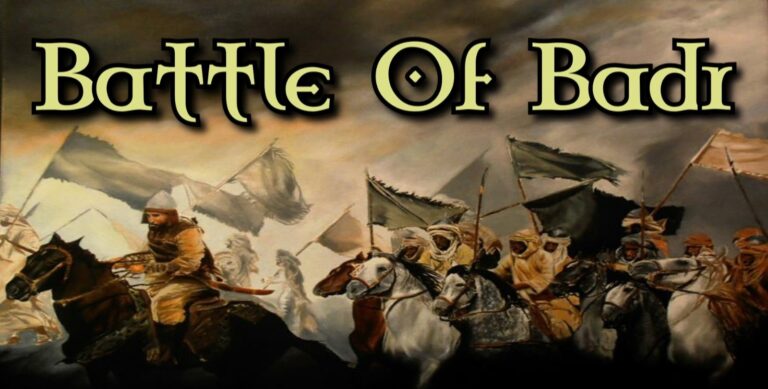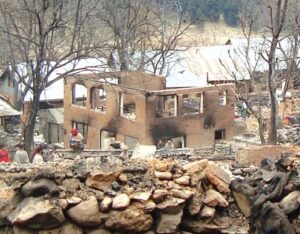
Battle of Badr and Lessons for the Opressed Muslims of Kashmir
Ibne Kashmir
Translated By: Idrees Bhat
Muslims were forced to leave their homeland Makkah by the pagans. The generous people of Madina hosted the Prophet Muhamad (PBUH) and his companions where they established an Islamic state. While leaving Makkah, the Prophet (PBUH) looked back with longing before making his way to Madinah saying,
‘How sweet of a land you are, and how beloved you are to me! If it were not that my people expelled me from you, I would not have lived in other than you.’ [Tirmidhi]
The lesson here is that, there may come a time when Muslims will be forced to leave their homelands. As our beloved Prophet (PBUH) looked back with a longing for Makkah, obviously, everyone loves the homeland where he is born. However, Prophets (PBUH) love for Makkah was not because of the land, property, clan, his memories etc. It was solely because he wanted to establish Islam in this land which was now lost to pagans. The holy Kaaba had become a place of Shirk, which was once built by our forefather Prophet Ibrahim (PBUH). The Prophet (PBUH) did not want to leave this holy place to the idol worshippers. Moreover, Allah says in the Quran,
“O you who believe! Ward off yourselves and your families against a Fire (Hell).’ [Al-Tahrim:6]
The philosophy behind this verse from the Quran is simple, the foremost responsibility of a Muslim is to protect himself, then his family, then the responsibility expands to your relatives, friends, and whosoever is living in your locality. Eventually, it then expands to the society of believers which we call country or state in modern terminology. Prophet Muhammad (PBUH) adopted the same strategy as he invited his family, clan and the whole of Makkah to Islam. When the hardships increase beyond your capacity, then you are permitted to do Hijra as Prophet (PBUH) did.
Kashmiri Muslims may face the similar situation in future and there may arise a situation when everyone can not do jihad against the oppressor. However, that should be the last choice of a believer. The reason for this is the same as was for the Muslims of Makkah. Every land where Islam was spread becomes a entrust for the believers. In Kashmir, thousands of our forefathers worked tirelessly to purify the land and people from Brahmin pagan worshipping. Over the centuries, Muslims put a lot of efforts to protect Islam in the land. An assault is underway which may overpower us. And under such circumstances the battle of Badr serves as one of the best lessons to seek inspiration. Let us go through the battle of Badr and its context.
It begins when the Prophet (PBUH) receives the news that Abu Sufiyan is leading a caravan which composed of many Camels, goods, money from the people of Quraish. Thecaravan was arriving back from Syria. Prophet (PBUH) decides to intercept and attack the caravan and take what this caravan was carrying to avenge for his people. In particular for what the Quraish had done to the Muslims in Makkah. They had taken their wealth, occupied their homes and properties and even killed many of them. So, the Prophet Muhammad (PBUH) marches out of Madina with 313 companions. It is important to mention that the Prophet (PBUH) had no intention to wage a war, therefore they did not have proper arms or one can say equipped well enough to fight a war. The maximum equipment one of the companions had was one sword and one shield. And the entire 313 companions had only two horses, 70 camels. Initially the caravan was composed of 60-70 people. Therefore, Prophet (PBUH) had no intention to wage a war. However, Abu Sufiyan got to know about the attack and he informed the Quraish to send assistance in the form of an army. It is reported that Abu Jahal who was very vindictive and filled with hate towards the Prophet (PBUH) prepared 1300 men to fight. Abu Sufiyan managed to escape and he sent a word to Abu Jahal that there was no need to leave Makkah as the caravan is safe. However, Abu Jahal insisted that he will face the Prophet (PBUH) at the well of Badr and crush the companions of Prophet (PBUH).
Another challenge that Muslims faced was that they had to confront their own kith and kin often brothers, sons or fathers in battle. In addition to the physical odds, the Muslims faced this huge psychological challenge as well. This is where a clear distinction emerges between those committed to Allah and His Prophet (PBUH) and those that take only worldly issues into account. Throughout history, earlier Prophets had to abandon their mushrik relatives. Nuh (AS) was told to abandon his mushrik son, while Ibrahim (AS) abandoned his mushrik father. And Lut (AS) was commanded to leave his deviant wife behind. Untested in battle, some Muslims were apprehensive. This was even reflected in the tearful dua the Prophet (PBUH) offered beseeching Allah’s help in this critical hour.
“O Allah, if these few servants of Yours are defeated today, there will be nobody left to proclaim Your name.”
Allah was not going to let His beloved Prophet down on this crucial day. The Prophet (PBUH) and his companions had suffered grievously for many years in Makkah and shown great patience in adversity. The Makkan mushriks, supremely arrogant in their numbers and weapons, assumed that they would soon finish off the rag-tag band of a few hundred Muslims. Allah, however, had other plans. He had willed that the two groups meet to establish the power of Islam on earth.
“[Recall] when in your dream, Allah showed them to you few in number. And if He hadshown them to you many in number, you would have been demoralized and would have disputed in the matter, but Allah saved (you)…and when, at the time you met each other, He showed them to you few in number in your eyes, and reduced your number in their eyes, so that Allah might accomplish what was destined to occur.” [8: 43-44]
The Battle of Badr established a fundamental Islamic tenet: the outcome of a battle is not solely dictated by material strength, but rather, it is the faith (Imaan) and resolve of the combatants that determine victory. This lesson from Badr has been witnessed in several places, where devout Muslims, even when faced with mighty rivals, have managed to hold their ground and emerge victorious. Examples include the persistent struggle of the Palestinians against the Zionist forces and their allies, the Afghan resistance first against the Soviet invasion (1979-1988) and later against American invasion (2001-2021), and Hezbollah’s successful confrontations with the Zionist forces in 2000 and 2006.
Kashmiri Muslims are also facing a mighty enemy with no resources to fight. However, as mentioned the choice is whether to die as martyrs or as slaves. The enemy has employed our own kith and kin against us and they have been doing their job with utmost loyalty. Just like our Prophet (PBUH) and his companions confronted their own clan, families and friends, we and our clans are not any special. We do not need any scholarly fatwa to do jihad against Kashmiri Muslims who are serving the kuffar to Hinduise and de-islamize our land. It is a entrust bestowed upon us by our forefathers who brought Islam to this land. As mentioned, the purpose of our Prophet (PBUH) was to attack the caravan of Abu Sufiyan and loot the belongings in response the loot and plunder which the Makkans had done to Muslims. India has plundered our properties and families and our so-called Kashmiri Muslims in the form of police, bureaucrats, tehsil dars, patwaris, socio cultural organizations, religious clerics have been at the forefront to assist and aid our oppressor. We will act against them InshaAllah. Although we find it extremely difficult to arrange our resources, however, our spirits are high. We seek inspiration from events like Battle of Badr and InshaAllah, Allah will aid us through multiple ways just like HE aided the mujahideen before us.
Ibne Kashmir is commanding a cadre of Hizbul Mujahideen in North Kashmir
(This article appeared in the April Issue of RR last year)



